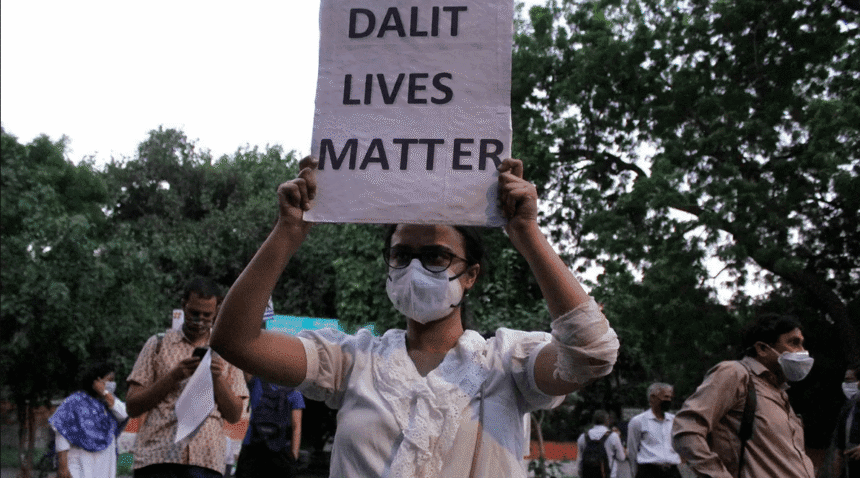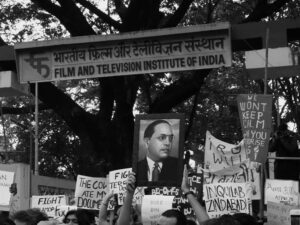In the Bilaspur constituency of Chhattisgarh, represented by BJP Member of Parliament and Union minister Tokhan Sahu, an alarming pattern of violence targeting Dalit individuals has emerged. Hindu religious spaces have increasingly become the backdrop for caste-based assaults.
Two separate and severe attacks occurred on consecutive nights during Hindu religious celebrations, resulting in two Dalit youth, including a minor, suffering serious injuries. The broader narrative consumed and propagated during this ‘festive season’ by caste Hindus may speak of peace and brotherhood; however, the recurring violence against Dalit individuals who enter public spaces during village-level Hindu festivals reveals a troubling reality marked by violations of fundamental rights.
On October 19, 2025, the first incident occurred during Kali Mata Puja in Mahmand village. Sixteen-year-old Ashutosh Barle, a tenth-grade student returning home for a two-day visit, was drawn to the festivities. His mother, Sarita Barle, recounted, “The DJ caught his curiosity, so he went there.” At the celebration, Ashutosh was confronted by Pradeep Maharaj, who hurled casteist insults before physically attacking him. Soon, several others joined in, beating him with fists and rods.
Ashutosh lost consciousness, and a villager called his mother, prompting Sarita to rush home. The assailants followed, throwing stones at their house, forcing Sarita to lock herself and her younger children inside for safety. Sarita indicated that the police were reluctant to accurately document the incident.
The next night, on October 20, another assault occurred during the Laxmi Utsav celebration in Bharda village. Lokesh Kumar Jangde, a 20-year-old Dalit farmer and driver, was watching the event when Amit Yadav, from a dominant caste, challenged his presence. After verbally abusing Lokesh’s family, he and others violently attacked him, dragging him away from the crowd.
This village contains only one Scheduled Caste family, with others belonging to OBC and general castes. Although an FIR has been filed, reports suggest the Yadav family is pressuring Lokesh to retract his complaint.
Missing the SC/ST Atrocity Act
Chhattisgarh has a history of social justice activism, notably through Guru Ghasidas, a 19th-century saint who fought against caste oppression, leading to the formation of the Satnami sect, which many Dalit communities follow today.
Activist Sanjeet Barman noted that the Chamar community, significant among Satnami followers, typically avoids Hindu festivals due to a heightened risk of violence. He expressed concern over the Torwa Police Station’s failure to handle the complaints properly, stating that the police abused victims’ families and accused the minor of inappropriately attending a “higher-caste festive function”—an act he termed victim-blaming.
Despite these incidents being rooted in caste-based violence against Scheduled Caste individuals, FIRs were not filed under the Scheduled Castes and Scheduled Tribes (Prevention of Atrocities) Act, 1989. This act is pivotal, as it addresses caste-based violence with provisions for special courts, expedited trials, victim protection, and compensation, unlike the Indian Penal Code (IPC), which treats such incidents as generic offenses.
Barman hopes to encourage police compliance with the Atrocity Act in both cases and noted, “In Ashutosh Barle’s case, the POSCO Act is also missing.”
These incidents illustrate enduring caste animosity in rural Chhattisgarh, revealing systemic failures that obstruct justice for Dalit victims, who are entitled to legal protections.
Tags: Two Dalits assaulted during Hindu festivals in Chhattisgarh for entering ‘upper-caste’ spaces, police skip SC/ST Atrocity Act Extract 5 SEO-friendly keywords as tags. Output only keywords, comma separated.
Hashtags: #Dalits #assaulted #Hindu #festivals #Chhattisgarh #entering #uppercaste #spaces #police #skip #SCST #Atrocity #Act










